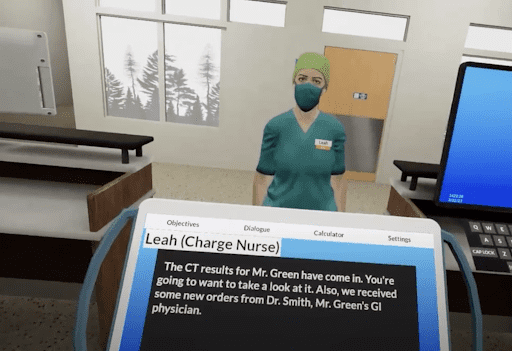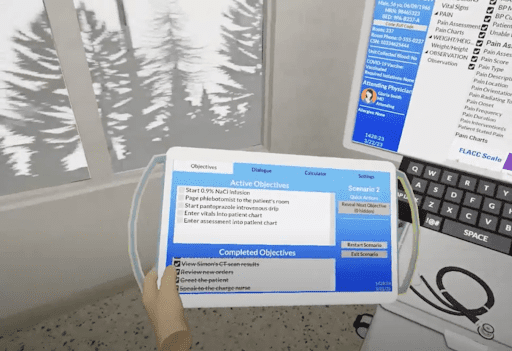This HBCU Is Using Virtual Reality To Train New Generation of Nurses
 Credit: Image Courtesy of Winston-Salem State University
Credit: Image Courtesy of Winston-Salem State University- The virtual reality (VR) clinical experiences replicate a safe hospital environment where students can interact with virtual patients.
- VR clinical experiences may impact the national nursing shortage by allowing the university to accommodate larger cohorts through immersive simulated experiences.
- The university has already talked to other North Carolina institutions about implementing the custom program developed with the University of North Carolina School of the Arts.
Winston-Salem State University (WSSU) is implementing virtual reality (VR) into its nursing curriculum to enhance skills and student retention and address the national nursing shortage.
The North Carolina historically Black college and university (HBCU) began implementing VR into its nursing curriculum on April 25 through a partnership with the University of North Carolina School of the Arts (UNCSA) and funding from the North Carolina Collaboratory.
The virtual reality experiences are meant to enhance clinical judgment and increase knowledge retention in a safe clinical environment in a way traditional simulated training cannot.
“The students, when they put on the headset, it’s like they’re really in the hospital, and they’re able to provide care as if they are in the hospital,” Leslee Battle, professor and dean of the School of Health Sciences, told BestColleges.
Battle said the virtual reality environment is created by UNCSA and designed by nurse faculty to replicate a hospital and patient room setting. Here in this environment, students can safely make mistakes.
“The only thing better would be actually being in the hospital.”

A student begins by putting on the headset where a virtual charge nurse, a registered nurse who oversees a department of nurses, greets them in a virtual hospital and shows the student to a patient’s room to become acclimated with the environment.
Then the student will take the appropriate medical documentation and be placed in specific scenarios for skills that cannot be taught using a traditional nursing simulation, like bedside manner and communication.
Battle gave an example where a virtual patient requests a Coca-Cola soda, and the student can decide whether or not to fulfill the request. Meanwhile, faculty are observing to evaluate critical thinking.
Battle said if the student brings the patient the soda, the student can see the consequence in which the virtual patient may vomit.
“I believe that it’s going to be a game changer. I think it has the potential to surpass the traditional simulation as we know it today,” Battle said.

She believes VR nursing simulation will indirectly impact the national nursing shortage. It allows WSSU to increase the number of students who graduate on time and are prepared for the National Council Licensure Exam (NCLEX).
“It starts in the curriculum to help impact,” Battle told BestColleges. “One of the variables that has contributed to the nursing shortage is that there aren’t enough clinical sites to support the required clinical rotations needed for learning experiences because there are limits to how many students you can have with one instructor in the hospital.
An increase in virtual reality simulated experiences, which can account for up to 50% of clinical experience in North Carolina, would allow WSSU to increase its cohort sizes. WSSU could split the cohort and alternate in-person with virtual reality clinical rotations.
“That’s why I say indirect impact on our nursing shortages. By way of helping students move through and helping universities graduate more students.”
Ryan Schmaltz, director of special VR projects at UNCSA, initially brought the idea to her. She, along with the associate dean of nursing and three other nurses working in the undergraduate program, collaborated with UNCSA filmmakers to develop a program to match the content measured by the NCLEX.
The NCLEX is the required professional licensure exam for prospective nurses to become registered nurses once they graduate. So, the team had to ensure the virtual environments aligned with the competencies WSSU expected from nursing program graduates.

The North Carolina Collaboratory funded almost $800,000 for both phases of the project after seeing how extraordinarily well it was going and how worthwhile and beneficial it would be for nursing students nationwide, Battle told BestColleges.
WSSU has already spoken to other North Carolina higher education institutions and one hospital system about implementing VR clinical training.
The curriculum has been live for about two weeks and has already gotten overwhelmingly positive feedback.
“All the students seem ecstatic,” she said. “I think the students they’ve enjoyed it so far, and you know this is our first go-round, and we get feedback from the students so we can continue to tweak it and continue to make it better.”
